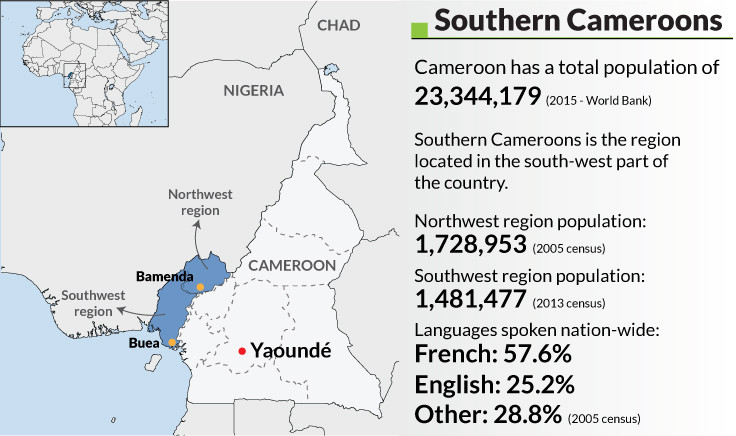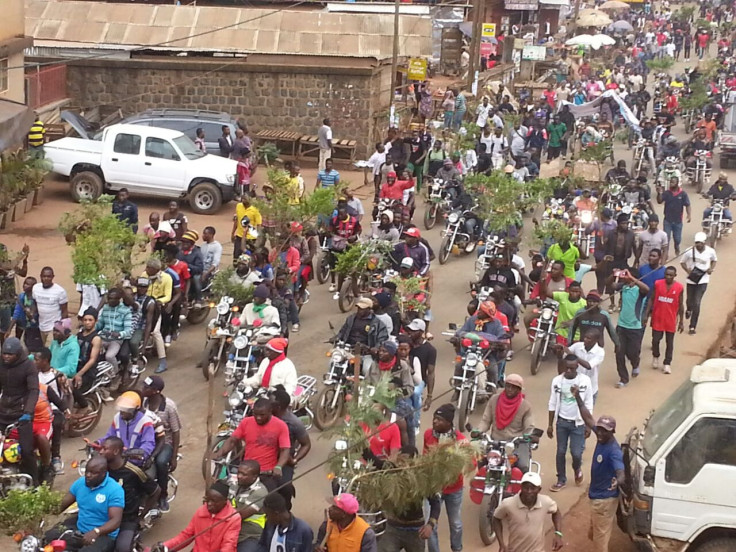Cameroon government 'will not work with camouflaged unions' calling for federation in Anglophone areas
EXCLUSIVE: IBTimes UK interviews government body and teachers union on unrest in Cameroon's Anglophone areas.
A committee set up by the Cameroonian government to address grievances in the country's Anglophone areas will not work with people calling for a return to a federal system, the head of the committee has told IBTimes UK. Protesters in the North-West and South-West provinces, Cameroon's only English-speaking areas, are calling for an end to the use of French and perceived disenfranchisement.
Lawyers, teachers and students have been striking in protest against the use of French in courts and schools, and the presence of "Francophone teachers" in English-speaking areas.
Some groups have taken to the streets demanding a return to a federal state system. Others are also calling for the breakaway of the North-West and South-West provinces and the restoration of the so-called "Southern Cameroons", a British mandate during colonisation.
The unrest has resulted in the death of at least four protesters in Bamenda, capital of North-West region, according to police sources.
Protests and calls for independence explained
French and English are the official languages of Cameroon. In October, a group of English-speaking lawyers took to the streets of Bamenda to protest against the use of French in courts and the lack of English versions of some legal acts and codes.
Demonstrations continued throughout November with lawyers striking in both the North West and South West, amid allegations the Cameroonian police "used tear gas to disperse" the lawyers.
The alleged police reaction sparked further demonstrations in Anglophone Cameroon.

'Southern Cameroons'
Southern Cameroons was the southern part of the British Mandate territory of Cameroons during the colonisation.
In 1961, people of Southern Cameroons voted whether to join Nigeria or the Republic of Cameroon, which had already obtained independence from Britain and France one year earlier.
The vote resulted in Southern Cameroons becoming part of the French speaking Republic of Cameroon.
In 1972, a new constitution was adopted in Cameroon, replacing the federal state with a unitary state.
The Cameroon Anglophone Movement was created in 1984. People originally sought a return to a federal system, but eventually started calling for independence.
More on possible alliance between Southern Cameroons and pro-Biafrans.
Ghogomu Paul Mingo, director of cabinet at the Prime Minister's Office and head of the recently-established committee, told IBTimes UK the body was created at the end of November, when Prime Minister Philemon Yang met teacher unions in Bamenda.
"Among other things, the government committed to creating a committee and said it would deliver on other points within the next three days, but teachers and students had to go back to school," he said.
However, the strike continued with students and teachers refusing to go back to school.
"On 6 December we had a meeting, but instead of telling me why they could not suspend the strike, the teacher groups started talking about the referendum,"Mingo said.
He added the committee was willing to engage with the unions, as long as they suspend the strike.
"Education is not political in Cameroon and I am in charge of talks on education and nothing else. I will not sit with teachers who are just a camouflage that represent political organisations. Cameroon became one country in 1961 and, 55 years later, we cannot go back."
Strike 'will continue'
However, Wilfred Tassang, secretary general of Cameroon Teachers' Trade Union (Cattu), told IBTimes UK the strike will continue until the government addresses underlying causes that led to the current unrest.
"The union has not called for street demonstrations, but when we decided to close the schools, all the issues of marginalisation surfaced and that's where we are at the moment and we call on the government to sort out these issues," he said.
"The unions are calling for a referendum so that we would be able to manage ourselves and our culture, our education and legal systems and the country would be able to survive."
Mingo explained that, among other things, the committee committed to recruiting "1,000 teachers for technical college," but Tassang said the unions are opposing this decision.
"Unions also said the strike won't be suspended until the government withdraws its intention to bring in 'bilingual science/technical teachers,' a new nomenclature for Francophones," he said.
Tassang added people were not protesting in Bamenda on 9 November, but he said teachers and students would continue to stay at home.
"Students who were in boarding schools are now at home with their parents and the first term has been suspended," he claimed.

© Copyright IBTimes 2025. All rights reserved.






















